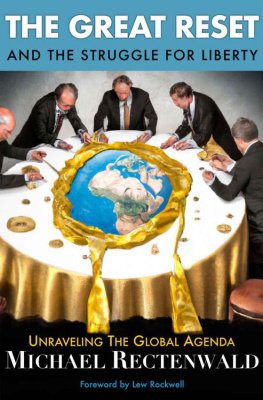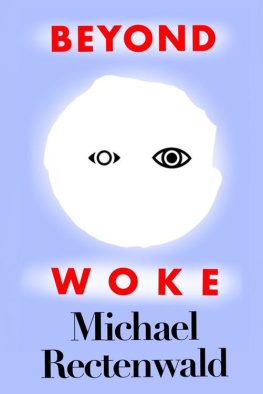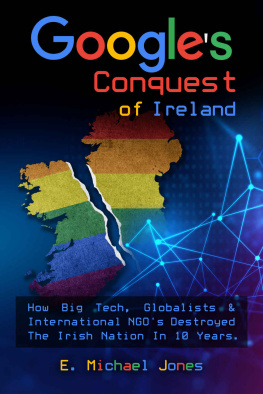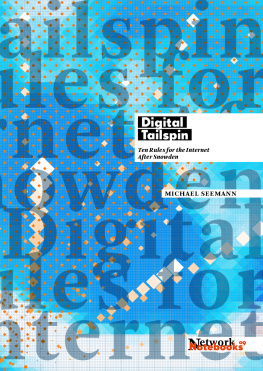Michael Rectenwald - Google Archipelago: The Digital Gulag and the Simulation of Freedom
Here you can read online Michael Rectenwald - Google Archipelago: The Digital Gulag and the Simulation of Freedom full text of the book (entire story) in english for free. Download pdf and epub, get meaning, cover and reviews about this ebook. year: 2019, publisher: New English Review Press, genre: Politics. Description of the work, (preface) as well as reviews are available. Best literature library LitArk.com created for fans of good reading and offers a wide selection of genres:
Romance novel
Science fiction
Adventure
Detective
Science
History
Home and family
Prose
Art
Politics
Computer
Non-fiction
Religion
Business
Children
Humor
Choose a favorite category and find really read worthwhile books. Enjoy immersion in the world of imagination, feel the emotions of the characters or learn something new for yourself, make an fascinating discovery.

- Book:Google Archipelago: The Digital Gulag and the Simulation of Freedom
- Author:
- Publisher:New English Review Press
- Genre:
- Year:2019
- Rating:4 / 5
- Favourites:Add to favourites
- Your mark:
- 80
- 1
- 2
- 3
- 4
- 5
Google Archipelago: The Digital Gulag and the Simulation of Freedom: summary, description and annotation
We offer to read an annotation, description, summary or preface (depends on what the author of the book "Google Archipelago: The Digital Gulag and the Simulation of Freedom" wrote himself). If you haven't found the necessary information about the book — write in the comments, we will try to find it.
Google Archipelago: The Digital Gulag and the Simulation of Freedom — read online for free the complete book (whole text) full work
Below is the text of the book, divided by pages. System saving the place of the last page read, allows you to conveniently read the book "Google Archipelago: The Digital Gulag and the Simulation of Freedom" online for free, without having to search again every time where you left off. Put a bookmark, and you can go to the page where you finished reading at any time.
Font size:
Interval:
Bookmark:
Google Archipelago
The Digital Gulag and
the Simulation of Freedom
Michael Rectenwald
Copyright Michael Rectenwald, 2019
All rights reserved. No part of this book may be reproduced in any form or by any means, electronic or mechanical, without permission in writing from the publisher except by reviewers who may quote brief passages in their reviews.
Published by New English Review Press
a subsidiary of World Encounter Institute
PO Box 158397
Nashville, Tennessee 37215
&
London, England, WC1N 3AX
Cover Art and Design by Kendra Mallock
ISBN: 978-1-943003-29-7
E-Book Edition
NEW ENGLISH REVIEW PRESS
newenglishreview.org
I dedicate this work to my son, Dylan.
D ylan has served as my personal hero and inspiration through the struggles and the joys Ive encountered over the past two yearsfrom the travails with the whirling dervishes of social justice, to the loss of a long-term love, to the rescue of a glorious soul, to the final decampment of a true friend.
In person, but also through his music, Dylan has brought meaning and comfort to my sometimes roiled emotions, great joy and pride to my heart, courage to my flagging spirit, and always tears to my eyes.
On January 29, 2018, my 59th birthday, Dylan was diagnosed with stage-four lymphoma. Driving back from New York to Pittsburgh the next day to be with him, my birthday having meant nothing, I told myself, and someone much greater than me, that I would not make it without Dylan. I asked this person, Why are you trying to crush me?
Shortly thereafter, He responded: Dylan will be finein fact, glorious, splendid, blessed and preserved, no matter what. And so, too, will you. The skies opened for me just then, and I was granted a wholly new faith.
In June of the same year, Dylan was pronounced cancer-free. We rejoiced, and so did the person who told me that all was well, even when I would have thought that it was anything but. He had expected and waited on our joy, reveling it in it with us. So too did Dylans wonderful girlfriend, who had been by his side every day through all his treatments, and his best friend from childhood, such a beautiful soul, that it is no wonder he loved Dylan as if himself. He knew more than all of us.
Then, as if Dylan hadnt faced enough for a 26-year-old in one year, a mere three months later, we received the tragic news of the death of this best friend of Dylans. I cannot pretend to know the depths of Dylans sorrow or the effects of such a great loss, someone about whom Dylan would sing, Theres no me, without you. I missed him too. We all did, and still do. Yet with courage and incredible equanimity, Dylan took hope in the love of it all, and kept pressing on.
At the same time, the very person who told me that Dylan would be fine, no matter what, told me (and many others as well), that the same was true of Dylans dearest friend. We know with sublime certainty that he is fine, glorious, splendid, blessed, and preserved, no matter what.
Thus, the center of Dylans life over the past nearly two years has been the soul of my own, has become the beating of my own heart, a full and overflowing heart that was bruised, but never crushed. Thus, when I hear Dylans songs, I realize the truth, and also the wonder of the fact, that I have no control, but paradoxically, that I am safe.
God bless you, Dylan. Your friend looks over your noble soul, brimming over with uncontainable pride and with his inimitable and contagious smile, rooting for you, as I will do, forever.
Acknowledgments G oogle Archipelago has been the most difficult to write of all my books to date. The difficulty, I think, was partly owing to the scale, complexity, and polymathic nature of the topic. But its sheer extent does not fully explain the enormity of the task. In Nineteenth-Century British Secularism: Science, Religion and Literature (2016), the breadth of material was at least as great, but except for the notoriously tortoise-paced release of related academic scholarship, the material stood still. In the case of Google Archipelago , no such luxury was afforded. The continuous, real-time, and vast influx of reports, exposs, and steady stream of books, made this a difficult beast to track and a nearly bottomless pit to survey. I appreciate and thank all of the friends, acquaintances, and strangers who fed me material daily. Appendix I includes important material that didnt make the main text, but which could have been incorporated, if time had no end.
I owe thanks first and foremost to my steady research team of two: my son, Dylan, and my long-time friend, associate, and editorial assistant, Lori Price. These two served as two sets of vigilant eyes. They helped me to search the overwhelmingly vast literature and offered their estimations of its importance and possible use. The final product is mine, so my faithful team members are blameless for any omissions, objectionable inclusions, or dubious interpretations. They did an excellent job.
Other readers of chapters at different stages include Daniel Mallock, Charles Michelsen, John Tangney, Robert Conan Ryan, Paul Redman, Francis (Buddy) Heshler, John-Michael Rectenwald, Jessica Durant, and Tessa Lena. The last helped with my Russian allusions and claims, about which I wont say more during this era of leftist McCarthyism.
I thank the person responsible for the ultimate, printed version of this text, my publisher, copy editor, and final arbiter, Rebecca Bynum. Rebecca has been patient and generous with me as a few deadlines came and went, despite my chasing them like a sprinter and marathon runner combined.
Finally, I want to thank the illustrious Glenn Beck for reading Google Archipelago , and for his avid interest and continual support. Glenn even read a passage for broadcast, which I asked him to do after listening to his brilliant renditions of Poes short stores. The podcast, which was released on August 17, 2019 on BlazeTV, is well worth the listen if only for Glenns masterful rendition of the text, which opens the show. Glenn is a truly wonderful person and a fine human being, someone whom I consider myself fortunate to number among my friendsI hope without presumption.
Foreword Portrait of a Whistleblower O n the day I met the Deplorable NYU Prof (@antipcnyuprof) in person for the first time, I was celebrating the successful defense of my PhD at the University of Pittsburgh. This was a hard-fought journey. Still, no rest for the wicked. I was drawn toward becoming a participant-observer in this major cultural crisis event. Such events start with an early trigger point that sets off a cultural movement, cascading into a long series of other related events. The seminal event of the movement, surprisingly, centered around a friend of mine: Dr. Michael Rectenwald.
As business ethics is among my teaching and research interests, I was well acquainted with the notion of a whistleblower. We are told these folks are scapegoats who save our collective butts, at the price of their own careers, or worse. Their sacrifices do not immediately look noble, and initial ly their cries are met with moblike resistance. For the most troubling cases, its in no ones best interest to believe the whistleblower, as everyone is too invested in the scaffolding of beliefs that props up desirable outcomes. We are taught to look for a Sherron Watkins, who helped to take down the fraudulent leadership of business (Enron), despite the fact that its unusually high performance was driving everyones 401K to new heights. We scholars are also taught to look for Edward Snowden types to point out government (USA) hypocrisies, despite the fact that to do so runs against everyone elses vested interest in patriotism during waves of global terror. These sorts of classic whistleblowers at least have the support of half of society. The rightwing base is ever-ready to challenge the credibility of the government, and the leftwing base is ever-ready to challenge the credibility of business.
Font size:
Interval:
Bookmark:
Similar books «Google Archipelago: The Digital Gulag and the Simulation of Freedom»
Look at similar books to Google Archipelago: The Digital Gulag and the Simulation of Freedom. We have selected literature similar in name and meaning in the hope of providing readers with more options to find new, interesting, not yet read works.
Discussion, reviews of the book Google Archipelago: The Digital Gulag and the Simulation of Freedom and just readers' own opinions. Leave your comments, write what you think about the work, its meaning or the main characters. Specify what exactly you liked and what you didn't like, and why you think so.








